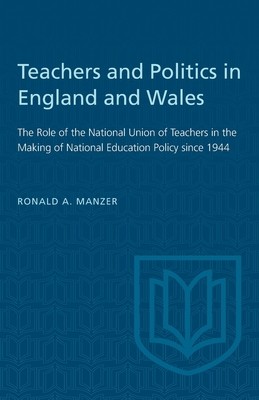
- We will send in 10–14 business days.
- Author: Ronald Manzer
- Publisher: University of Toronto Press
- ISBN-10: 1487581068
- ISBN-13: 9781487581060
- Format: 14 x 21.6 x 1 cm, minkšti viršeliai
- Language: English
- SAVE -10% with code: EXTRA
Reviews
Description
Education is a powerful factor in determining the shape of a modern society. Recognition of its importance for the wealth and power of a society has risen dramatically in recent years. As a result, the 'demand' for education has increased; and education has assumed a prominent place among contemporary public issues. This change in the relationship between 'education' and 'politics' has, in turn, tended to disrupt the operation of established institutions and procedures for making educational policy and caused a search for new organizational forms.
Educational policy-making in England and Wales in the 1940s and early 1950s was characterized by a closed partnership of the Ministry of Education, the local education authorities, and the teachers' unions. The circumstances which made their relationship easy and viable changed as the demand for education increased during the later 1950s and early 1960s, and the institutions and procedures which typified the earlier period -- the National Advisory Council for the Training and Supply of Teachers, the Secondary Schools Examinations Council, the Burnham Main Committee -- were put under pressure to change as well.
Teachers and Politics describes the main institutions and procedures for making national education policy in England and Wales since 1944 and attempts to assess the effect that post-war changes in the demand for education have had on them. The analysis is given special focus by its emphasis on the ability of teachers' unions, especially the National Union of Teachers, to influence the making of educational policy.
EXTRA 10 % discount with code: EXTRA
The promotion ends in 23d.05:23:10
The discount code is valid when purchasing from 10 €. Discounts do not stack.
- Author: Ronald Manzer
- Publisher: University of Toronto Press
- ISBN-10: 1487581068
- ISBN-13: 9781487581060
- Format: 14 x 21.6 x 1 cm, minkšti viršeliai
- Language: English English
Education is a powerful factor in determining the shape of a modern society. Recognition of its importance for the wealth and power of a society has risen dramatically in recent years. As a result, the 'demand' for education has increased; and education has assumed a prominent place among contemporary public issues. This change in the relationship between 'education' and 'politics' has, in turn, tended to disrupt the operation of established institutions and procedures for making educational policy and caused a search for new organizational forms.
Educational policy-making in England and Wales in the 1940s and early 1950s was characterized by a closed partnership of the Ministry of Education, the local education authorities, and the teachers' unions. The circumstances which made their relationship easy and viable changed as the demand for education increased during the later 1950s and early 1960s, and the institutions and procedures which typified the earlier period -- the National Advisory Council for the Training and Supply of Teachers, the Secondary Schools Examinations Council, the Burnham Main Committee -- were put under pressure to change as well.
Teachers and Politics describes the main institutions and procedures for making national education policy in England and Wales since 1944 and attempts to assess the effect that post-war changes in the demand for education have had on them. The analysis is given special focus by its emphasis on the ability of teachers' unions, especially the National Union of Teachers, to influence the making of educational policy.


Reviews